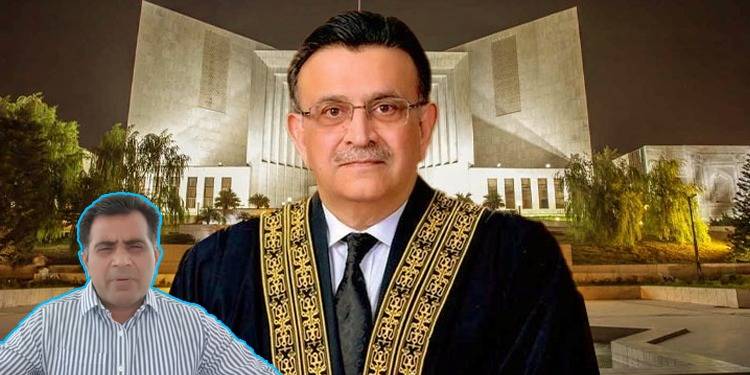
The government will be reviewing the law aimed at curtailing the powers of Chief Justice of Pakistan Umar Ata Bandial, and this move would be a massive relief for the top judge, says journalist Imran Waseem.
A notification by the government in this regard is expected in the forthcoming days, Waseem maintained.
He further said that the committee of the Supreme Court, earlier envisaged for the apex court's cases had a quite vast jurisdiction, but that may not be the case in the future.
In a podcast on Saturday, the journalist said that the committee proposed in the parliament's bill, would have essentially limited CJ Bandial's administrative powers.
"The government would limit the committee's jurisdiction to Article 184-3 [suo motu powers]. A review of the law would mean that the top judge will still be able to exercise his powers related to the formation of special benches." he maintained.
The legislation
The bill, a copy of which is available with The Friday Times, suggests that “every cause, appeal or matter before the Supreme Court shall be heard and disposed of by a bench constituted by the Committee comprising the Chief Justice of Pakistan and two senior-most judges, in order of seniority.”
According to the draft legislation, any matter invoking the exercise of original jurisdiction under Article 184 (3) shall be first placed before the committee of three senior-most judges.
“If the Committee is of the view that a question of public importance with reference to enforcement of any of the fundamental rights conferred by Chapter I of Part II of the Constitution is involved, it shall constitute a bench comprising not less than three judges of the Supreme Court of Pakistan which may also include the members of the Committee, for adjudication of the matter,” it says.
The legislation also calls for appeals within 30 days of a verdict, issued on a suo motu case, and suggests that a bench be formed to hear such an appeal within 14 days.
A notification by the government in this regard is expected in the forthcoming days, Waseem maintained.
He further said that the committee of the Supreme Court, earlier envisaged for the apex court's cases had a quite vast jurisdiction, but that may not be the case in the future.
In a podcast on Saturday, the journalist said that the committee proposed in the parliament's bill, would have essentially limited CJ Bandial's administrative powers.
"The government would limit the committee's jurisdiction to Article 184-3 [suo motu powers]. A review of the law would mean that the top judge will still be able to exercise his powers related to the formation of special benches." he maintained.
The legislation
The bill, a copy of which is available with The Friday Times, suggests that “every cause, appeal or matter before the Supreme Court shall be heard and disposed of by a bench constituted by the Committee comprising the Chief Justice of Pakistan and two senior-most judges, in order of seniority.”
According to the draft legislation, any matter invoking the exercise of original jurisdiction under Article 184 (3) shall be first placed before the committee of three senior-most judges.
“If the Committee is of the view that a question of public importance with reference to enforcement of any of the fundamental rights conferred by Chapter I of Part II of the Constitution is involved, it shall constitute a bench comprising not less than three judges of the Supreme Court of Pakistan which may also include the members of the Committee, for adjudication of the matter,” it says.
The legislation also calls for appeals within 30 days of a verdict, issued on a suo motu case, and suggests that a bench be formed to hear such an appeal within 14 days.

